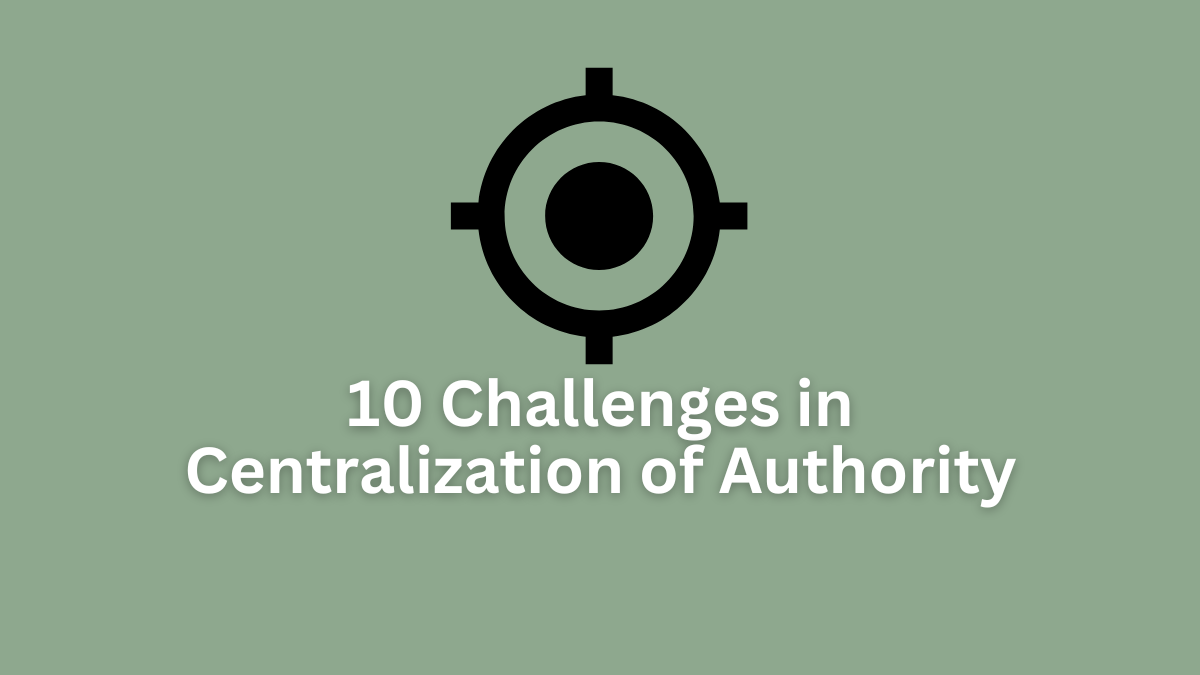Challenges in Centralization
Centralization of authority is the concentration of decision-making power and control within a single individual or a select group at the top of an organization’s hierarchy, limiting autonomy at lower levels.
Centralization of authority, while offering certain advantages, also presents numerous challenges that organizations must navigate to ensure effective decision-making and operations. Below are 10 key challenges in centralization and strategies to overcome them:
Lack of Flexibility
Challenge: Centralized decision-making can lead to rigidity and a lack of adaptability, making it difficult for organizations to respond swiftly to changing market conditions or emerging opportunities.
Strategy: Implement mechanisms for periodic review and adjustment of centralized policies and procedures to ensure alignment with evolving needs and circumstances. Empower lower-level managers with the authority to make timely decisions within their areas of expertise.
Reduced Innovation
Challenge: Centralization may stifle innovation as lower-level employees may feel disempowered and less inclined to contribute creative ideas or solutions.
Strategy: Foster a culture of innovation by providing platforms for idea generation and collaboration across all levels of the organization. Encourage open communication channels where employees feel valued and supported in sharing their innovative concepts.
Slow Decision-Making
Challenge: Centralized decision-making processes can be slow and cumbersome, particularly when all decisions must pass through a limited number of higher-level authorities.
Strategy: Delegate decision-making authority to lower levels of management, empowering them to make decisions within predefined parameters. Implement clear guidelines and escalation procedures to expedite decision-making when necessary.
Lack of Employee Engagement
Challenge: Employees may feel disconnected and disengaged in a centralized environment where decision-making authority is concentrated at the top.
Strategy: Promote transparency and inclusivity by involving employees in the decision-making process whenever feasible. Provide opportunities for professional development and career advancement to enhance employee motivation and engagement.
Dependency on Central Authority
Challenge: Overreliance on centralized decision-making can create a bottleneck where all critical decisions hinge on the availability and judgment of a few key individuals.
Strategy: Distribute decision-making authority across various levels of the organization, empowering managers and teams to take ownership of their responsibilities. Foster a culture of accountability where individuals are held responsible for their decisions and actions.
Read More: 10 Challenges in Organizing
Resistance to Change
Challenge: Centralization may face resistance from employees accustomed to decentralized decision-making or accustomed to autonomy in their roles.
Strategy: Communicate the rationale behind centralization initiatives clearly, highlighting the potential benefits for both the organization and individual employees. Provide training and support to help employees adapt to new processes and procedures.
Decreased Morale and Motivation
Challenge: Employees may experience reduced morale and motivation in a centralized environment where they feel their contributions are undervalued or overlooked.
Strategy: Recognize and reward employee achievements to reinforce a sense of purpose and appreciation. Provide opportunities for skill development and career advancement to empower employees and boost morale.
Read More: 10 Challenges in Group Decision Making
Communication Challenges
Challenge: Centralization can lead to communication breakdowns as information may not flow freely between different levels of the organization.
Strategy: Establish clear communication channels and protocols to ensure effective information sharing and collaboration. Foster a culture of open communication where feedback is encouraged and valued.
Risk of Micromanagement
Challenge: Centralization may inadvertently promote micromanagement as higher-level authorities seek to exert control over every aspect of operations.
Read More: 10 Challenges in Departmentalization
Strategy: Trust and empower managers at all levels to make decisions within their areas of responsibility. Provide guidance and support, but avoid unnecessary interference in day-to-day operations.
Inefficiency and Redundancy
Challenge: Centralization can lead to inefficiencies and redundancy as decisions may be delayed or duplicated due to bureaucratic processes.
Strategy: Streamline decision-making processes and eliminate unnecessary layers of approval to improve efficiency. Invest in technology and automation tools to facilitate communication and decision-making across the organization.
Hence, these are the 10 challenges in centralization of authority and strategies to overcome those challenges.
Read Next: 10 Challenges in Delegation of Authority
